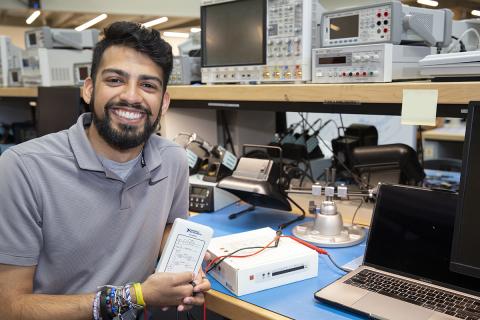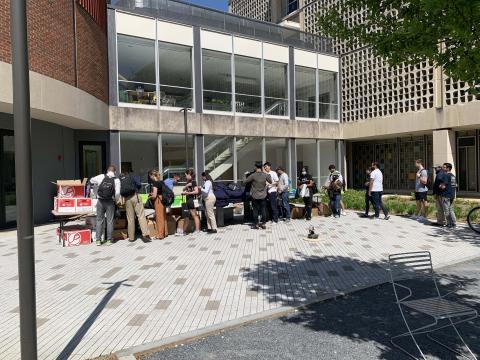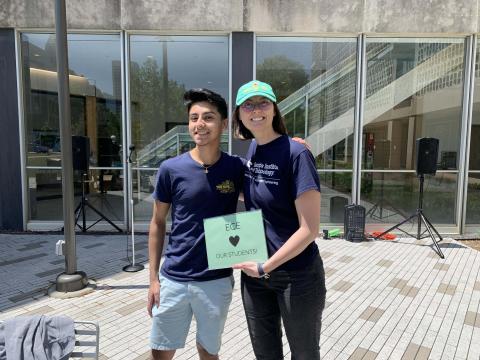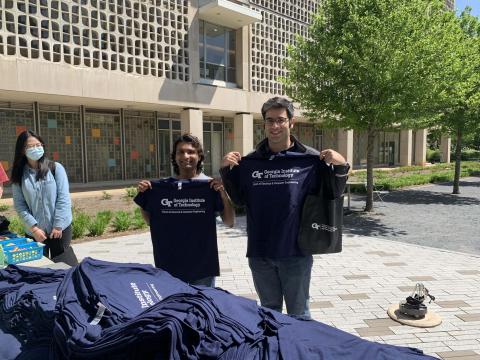The pandemic has taken — and will continue to take— a heavy toll. Getting students oriented and helping them succeed will require innovative new approaches to student support. Under the leadership of ECE Chair Arijit Raychowdhury, Georgia Tech’s School of Electrical and Computer Engineering has developed ECE Cares to capture initiatives aimed at strengthening student well-being and community building, as well as the infrastructure and technology support needed for academic success. ECE Cares will be incorporated throughout the many levels of the School by reinforcing existing initiatives and creating new ones.
The pandemic has taken — and will continue to take— a heavy toll. Getting students oriented and helping them succeed will require innovative new approaches to student support. Under the leadership of ECE Chair Arijit Raychowdhury, Georgia Tech’s School of Electrical and Computer Engineering has developed ECE Cares to capture initiatives aimed at strengthening student well-being and community building, as well as the infrastructure and technology support needed for academic success. ECE Cares will be incorporated throughout the many levels of the School by reinforcing existing initiatives and creating new ones.
Even before the Covid-19 pandemic, colleges and universities across the country were facing an extensive increase in the number of students reporting mental health struggles and seeking on-campus resources.
Arijit Raychowdhury, professor and Steve W. Chaddick School Chair of the Georgia Tech School of Electrical and Computer Engineering (ECE), knows that while the pandemic has added innumerable challenges, it has also provided an opportunity for higher-learning institutions to re-think and prioritize initiatives aimed at student support.
“The Institute offers many meaningful resources for students. Due to our proximity with that community, ECE has an important vantage point to understand student needs and deliver on them,” said Raychowdhury. “We can directly ensure all students have what they need to excel, not only academically, but also personally and emotionally. We want everyone in the ECE community to know that we’re here for them and have their back.”
One of Raychowdhury’s top priorities since becoming chair in December 2021 has been to create sustainable, recurring student support initiatives that can be embedded within the School and live beyond a particular chair’s tenure. As the world and Georgia Tech return to more in-person activities and a new “normal,” the School has launched his new initiative, ECE Cares.
What is ECE Cares?
While still in development, ECE Cares is an umbrella program to capture initiatives aimed at strengthening student support and community building. Overseen by Raychowdhury, ECE Cares will be incorporated throughout the many levels of the School by reinforcing existing initiatives and creating new ones.
The Student/Faculty Committee (SFC), a standing faculty committee within the School, has already played a significant role in ECE Cares. All SFC members have annual appointments and volunteer to serve. This academic year, Anna Holcomb, ECE lecturer and assistant director of the Undergraduate Professional Communications Program (UPCP), is co-chairing the committee with Associate Professor Chuanyi Ji.
“With the return to a bit of normalcy after the pandemic, we’ve been able to better reconnect with students and figure out their current needs,” said Holcomb. “We know that just because things may look better now, the pandemic has far-reaching and long-lasting consequences for our students that we need to respond to. That’s what we’re hoping ECE Cares can capture.”
This winter, Holcomb went on a listening tour to ECE student organizations to share ideas and get their feedback. Feedback from students was both macro and micro – many students reported missing out on small details like wanting ECE swag to show their pride for the School.
The committee, along with ECE leadership, then identified top priorities and programs to guide ECE Care’s activities moving forward, some of which have already been implemented.
Pre-Finals Student Wellness Drop-In
One such program took place before spring semester finals on April 16, when nearly 600 ECE undergraduate and graduate students attended the first-ever Pre-Finals Student Wellness Drop-In located in TI Plaza (outside Van Leer). Students built their own care packages — with study supplies, snacks, and ECE swag — to prep for finals. The event was organized by SFC and the ECE Student Advisory Council (SAC).
"School is extremely stressful before finals, and everyone is cooped up studying in the Clough Undergraduate Learning Commons and the library,” said Samay Chandna, president of the ECE Student Advisory Council. “I thought the event was a terrific way for students to take a study break, get some fresh air, and generally take a step back for a minute.”
Contributions from student leaders like Chandna and ECE Ph.D. student Lakshmi Raju were essential to ensuring a successful first event, according to Holcomb. The event is expected to take place every fall and spring semester as part of ECE Cares programming.
“ECE personnel and students being able to collaborate is what ECE Cares is all about,” said Holcomb. “There is already a growing culture of community and belonging among students that we can help foster.”
Equipment Support
Another fundamental goal of ECE Cares is to alleviate the financial burden associated with attending college. According to data provided by the financial aid office, up to 40% of students in ECE courses are Pell Grant recipients within any single semester.
There are many additional costs students are required to fund outside of tuition, books, and room and board, including course supplies and equipment. Currently in the pilot stage, ECE Cares’ first initiative to help curb equipment costs is the loaning of myDAQs. A myDAQ — which costs about $300 — is a portable data acquisition device that gives students the power to prototype systems and test circuits. It is utilized in ECE courses 2020, 2040, and 3710
“The program actually started with one student saying that the purchasing of a myDAQ was causing a financial hardship,” said Joy Harris, ECE affiliated faculty member and director of the Engineering for Social Innovation Center. “Three hundred dollars is a lot to a college student, so we knew it had to be affecting other students, and we began to look into how we could reduce that hardship.”
This spring, ECE was able to purchase 550 myDAQs from National Instruments. Students will be able to check out the myDAQs from the Georgia Tech Library starting in the fall semester. The program uniquely aids non-ECE majors, as many students within the College of Engineering are required (or elect) to take some myDAQ-required courses.
Rohan Sohani, the current president of Tech’s Student Government Association, championed the project on behalf of students. He is an aerospace engineering major who needed to purchase a myDAQ when he took ECE 3710.
“In my position, I was able to illuminate some financial burdens students face to Institute leaders,” said Sohani. “I hope that students being able to checkout a myDAQ will lead to similar opportunities across campus where students can save money. It also aligns with Tech’s goal to reduce waste because these loaner myDAQs will be much more beneficial than the ones collecting dust, stashed away in a desk somewhere.”
Looking Ahead
With the anticipated success of the loaner myDAQs, ECE Cares now plans to set up a similar offering by purchasing 450 Mbed devices for students to loan. Combined, the programs will effectively eliminate more than $500 per ECE student on course equipment fees, and will lower financial barriers for up to 4,000 students each semester across campus. The School also plans to loan out laptops purchased from Dell that ECE students can use on a short-term basis if their own computing equipment is being repaired.
Strengthening already existing offerings is another important factor as the School expands ECE Cares. For example, ECE 1100 (ECE Discovery Studio) – a required one-credit course for ECE first-years — will continue to play a significant role in preparing students for their time at Tech and ECE. Through ECE Discovery Studio, students can participate in the Peer Leader Program recently developed by Holcomb and Harris to cultivate a culture of peer mentorship. The course will also be a launchpad to introduce the resources and opportunities provided through ECE Cares to students.
Numerous additional ECE Cares programs and initiatives are in the works. Most notably, the School has created an academic professional position that will focus on teaching and helping ECE students respond to mental health needs. Having access to mental health professionals on campus and within ECE will not only benefit students, but also faculty through trainings and immediate expert support, according to Raychowdhury.
“Poor mental health leads to poor academic performance,” said Raychowdhury. “This position, combined with the entirety of ECE Cares, is a step in the right direction to further provide ECE students what they need to thrive and feel at home in this uncertain and demanding time.”
To inquire about how you can contribute to ECE Cares please contact the ECE Development team.
Additional Images




